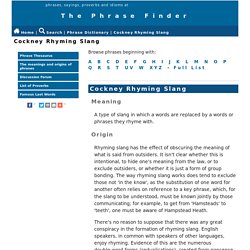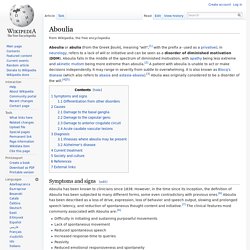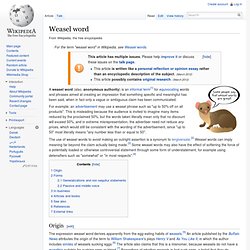

Cockney Rhyming Slang - an explanation and a list, with their meanings and origins.' - the meaning and origin of this phrase. Meaning A type of slang in which a words are replaced by a words or phrases they rhyme with.

Origin Rhyming slang has the effect of obscuring the meaning of what is said from outsiders. It isn't clear whether this is intentional, to hide one's meaning from the law, or to exclude outsiders, or whether it is just a form of group bonding. The way rhyming slang works does tend to exclude those not 'in the know', as the substitution of one word for another often relies on reference to a key phrase, which, for the slang to be understood, must be known jointly by those communicating; for example, to get from 'Hamsteads' to 'teeth', one must be aware of Hampstead Heath.
There's no reason to suppose that there was any great conspiracy in the formation of rhyming slang. Rhyming slang is an exuberant linguistic form and tends to flourish in confident, outgoing communities. "The profound contempt which the whaler expresses for the 'lubber of a jimmy-grant', as he calls the emigrant. " Cockney: Australia: Aboulia. Aboulia or abulia (from the Greek βουλή, meaning "will",[1] with the prefix a- used as a privative), in neurology, refers to a lack of will or initiative and can be seen as a disorder of diminished motivation (DDM).

Aboulia falls in the middle of the spectrum of diminished motivation, with apathy being less extreme and akinetic mutism being more extreme than aboulia.[2] A patient with aboulia is unable to act or make decisions independently. It may range in severity from subtle to overwhelming. It is also known as Blocq's disease (which also refers to abasia and astasia-abasia).[3] Abulia was originally considered to be a disorder of the will.[4][5] Symptoms and signs[edit] Aboulia has been known to clinicians since 1838. Difficulty in initiating and sustaining purposeful movementsLack of spontaneous movementReduced spontaneous speechIncreased response-time to queriesPassivityReduced emotional responsiveness and spontaneityReduced social interactionsReduced interest in usual pastimes.
Weasel word. A weasel word (also, anonymous authority) is an informal term[1] for equivocating words and phrases aimed at creating an impression that something specific and meaningful has been said, when in fact only a vague or ambiguous claim has been communicated.

For example, an advertisement may use a weasel phrase such as "up to 50% off on all products". This is misleading because the audience is invited to imagine many items reduced by the proclaimed 50%, but the words taken literally mean only that no discount will exceed 50%, and in extreme misrepresentation, the advertiser need not reduce any prices, which would still be consistent with the wording of the advertisement, since "up to 50" most literally means "any number less than or equal to 50". List of English language idioms.
This is a list of notable idioms in the English language.

An idiom is a common word or phrase with a culturally understood meaning that differs from what its composite words' denotations would suggest. For example, an English speaker would understand the phrase "kick the bucket" to mean "to die" – and also to actually kick a bucket. Furthermore, they would understand when each meaning is being used in context. An idiom is not to be confused with other figures of speech such as a metaphor, which invokes an image by use of implicit comparisons (e.g., "the man of steel" ); a simile, which invokes an image by use of explicit comparisons (e.g., "faster than a speeding bullet"); and hyperbole, which exaggerates an image beyond truthfulness (e.g., like "missed by a mile" ).
Idioms are also not to be confused with proverbs, which are simple sayings that express a truth based on common sense or practical experience. 117 Most beautiful words in the English language. Define Denizens at Dictionary. Define Stroppy at Dictionary. Define Abrasive at Dictionary. Define Acrimony at Dictionary. Define Tawdry at Dictionary. Define Privy at Dictionary. Define Rapacious at Dictionary.
Define Fastidious at Dictionary. Define Mincing at Dictionary. Define Admonished at Dictionary. Define Earnest at Dictionary. Define Loquacious at Dictionary. Define Lackadaisical at Dictionary. Define Tutelage at Dictionary. Define Prolific at Dictionary. Define Cynic at Dictionary. Define Perfunctory at Dictionary. Define Emaciated at Dictionary. Define Proselytizers at Dictionary. Define Pedantic at Dictionary. What is the Definition of Esoteric? Define Disparity at Dictionary. Law of Privilege. From Wikipedia, the free encyclopedia Privilege may refer to:

20 Common Grammar Mistakes That (Almost) Everyone Gets Wrong. I’ve edited a monthly magazine for more than six years, and it’s a job that’s come with more frustration than reward.

If there’s one thing I am grateful for — and it sure isn’t the pay — it’s that my work has allowed endless time to hone my craft to Louis Skolnick levels of grammar geekery. As someone who slings red ink for a living, let me tell you: grammar is an ultra-micro component in the larger picture; it lies somewhere in the final steps of the editing trail; and as such it’s an overrated quasi-irrelevancy in the creative process, perpetuated into importance primarily by bitter nerds who accumulate tweed jackets and crippling inferiority complexes. But experience has also taught me that readers, for better or worse, will approach your work with a jaundiced eye and an itch to judge. While your grammar shouldn’t be a reflection of your creative powers or writing abilities, let’s face it — it usually is. Who and Whom This one opens a big can of worms. Which and That Lay and Lie Moot Nor. Define Auspicious at Dictionary. Define Urbane at Dictionary. Define Abridge at Dictionary. Define Overwrought at Dictionary.
Zeitgeist. The Zeitgeist (spirit of the age or spirit of the time) is the intellectual fashion or dominant school of thought that typifies and influences the culture of a particular period in time.

For example, the Zeitgeist of modernism typified and influenced architecture, art, and fashion during much of the 20th century.[1] The German word Zeitgeist is often attributed to the philosopher Georg Hegel, but he never actually used the word. In his works such as Lectures on the Philosophy of History, he uses the phrase der Geist seiner Zeit (the spirit of his time)—for example, "no man can surpass his own time, for the spirit of his time is also his own spirit.
"[2] Other philosophers who were associated with such ideas include Herder and Spencer and Voltaire.[1] The concept contrasts with the Great Man theory popularized by Thomas Carlyle, which sees history as the result of the actions of heroes and geniuses. Zeitgeist theory and leadership[edit] Define Crass at Dictionary. Define Pretentious at Dictionary.
Define Abnegate at Dictionary. Define Emancipate at Dictionary. Define Posterity at Dictionary.
Define Appropriates at Dictionary.